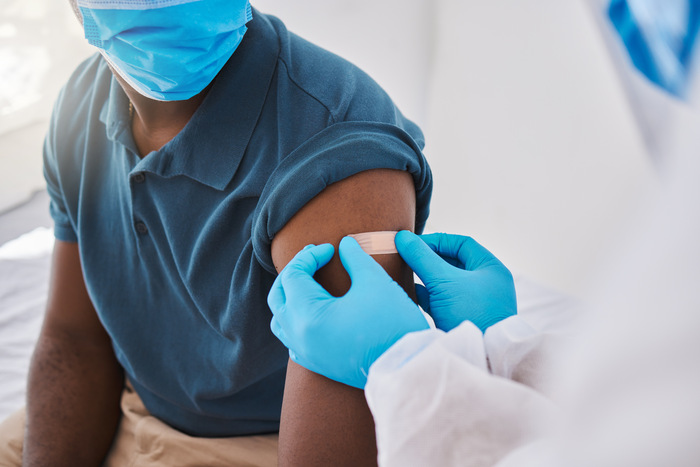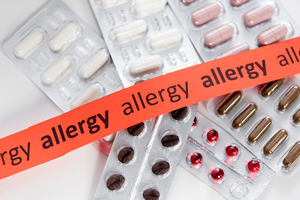Key points
- Typhoid fever is a severe illness caused by Salmonella Typhi, prevalent in areas with poor sanitation and limited clean water.
- The typhoid vaccine, either inactivated (injection) or live (oral), stimulates the immune system to fight the bacteria, reducing infection risk.
- The vaccine is recommended for individuals at higher risk of exposure to Salmonella Typhi, including laboratory workers, close contacts of infected individuals, and travelers to certain regions.
- Some individuals should avoid the vaccine due to specific health conditions or circumstances, including pregnancy, antibiotic use, compromised immune systems, and history of allergic reactions.
- The vaccine is recommended for those at higher risk, but certain individuals, including pregnant or breastfeeding women, those on certain medications, or with compromised immune systems, should avoid it.

Typhoid fever, a serious and potentially life-threatening illness caused by the bacterium Salmonella Typhi, remains a significant public health concern, particularly in regions with limited access to clean water and sanitation, according to the World Health Organization (WHO).
This article delves into the critical importance of the typhoid vaccine, a preventive measure that can significantly reduce the risk of contracting this debilitating disease. By understanding the benefits, types, and availability of the typhoid vaccine, individuals can make informed decisions to protect themselves and their communities from the severe health impacts of typhoid fever.
What Is the Typhoid Vaccine?
The typhoid vaccine is a crucial preventive measure designed to protect individuals from typhoid fever, a serious illness caused by the Salmonella Typhi bacteria, according to the CDC. They note that by stimulating the body's immune system to recognize and fight the bacteria, the vaccine significantly reduces the risk of infection. The duration of protection varies depending on the type of vaccine received, typically lasting several years before a booster is needed.
There are two main types of typhoid vaccines, according to the CDC. The inactivated typhoid vaccine, also known as the Typhoid Vi Polysaccharide Vaccine, is made from a purified component of the bacteria and is administered via injection. This vaccine provides protection for about two years, after which a booster shot is recommended for continued immunity, according to the CDC. The second type is the live typhoid vaccine, known as Ty21a, which is an oral vaccine containing a live but weakened form of the bacteria, according to the CDC. This version stimulates the immune system without causing disease and offers protection for about five years, with booster doses recommended every five years for those who remain at risk, according to the CDC. Understanding these options allows individuals to choose the most appropriate vaccine based on their health status, travel plans, and exposure risk.
What Is Typhoid Fever?
Typhoid fever is a severe and potentially life-threatening illness caused by the bacterium Salmonella Typhi, according to the CDC. They note that it is a significant public health issue, particularly in areas with inadequate sanitation and limited access to clean water. Understanding the nature of this disease, its symptoms, transmission, and potential complications is essential for recognizing its seriousness and the importance of preventive measures, such as vaccination.
Typhoid fever typically presents with a high fever, weakness, stomach pain, headache, and loss of appetite, according to the CDC. They explain that in some cases, individuals may also experience a rash of flat, rose-colored spots. The bacteria are usually transmitted through contaminated food and water, making it a common issue in regions where sanitation practices are poor. Once ingested, the bacteria multiply in the intestines and bloodstream, leading to the onset of symptoms. If left untreated, typhoid fever can cause severe complications, including intestinal perforation, which can be fatal.
Diagnosis of typhoid fever usually involves blood, stool, or urine tests to detect the presence of Salmonella Typhi, according to the CDC. They also note that treatment primarily consists of antibiotics to eliminate the bacteria, along with supportive care to manage symptoms. However, antibiotic resistance is an emerging problem, making prevention through vaccination and improved sanitation practices even more critical. By understanding the nature of typhoid fever and its transmission, individuals can take proactive steps to protect themselves and their communities from this dangerous disease.
What Causes Typhoid Fever?
Typhoid fever is caused by the bacterium Salmonella Typhi, which is transmitted through the ingestion of contaminated food and water, according to the WHO. They note that understanding the common sources of this bacterium can help individuals take preventive measures to reduce their risk of infection. The following are some of the most frequent sources of typhoid bacteria, according to the WHO and CDC:
-
Condiments: Often shared and left at room temperature, they can become contaminated.
-
Food from street vendors: May not follow proper hygiene practices, increasing the risk of contamination.
-
Fountain drinks: Can be made with contaminated water or ice.
-
Ice: Often made from contaminated water sources.
-
Raw or soft-cooked eggs, meat, and fish: Can carry the bacteria if not cooked thoroughly.
-
Room temperature food: Can become a breeding ground for bacteria if left out for extended periods.
-
Salad: Made with raw vegetables that may not be washed properly.
-
Tap water: In regions with poor sanitation, it can be a direct source of the bacteria.
-
Unpasteurized dairy products: Can harbor bacteria due to a lack of proper processing.
-
Unwashed fruit and vegetables: Can carry bacteria from contaminated water or soil.
-
Well water: May be contaminated if not properly treated or if sanitation around the well is poor.
By being aware of these common sources, individuals can take steps to avoid exposure to Salmonella Typhi and reduce their risk of contracting typhoid fever, according to the CDC.
Who Should Get the Typhoid Vaccine?
The typhoid vaccine is recommended for individuals at higher risk of exposure to Salmonella Typhi, the bacterium responsible for typhoid fever, according to the WHO. They note that this includes laboratory workers who handle the bacteria and people who come into close contact with someone infected with typhoid fever. Additionally, travelers to certain regions where typhoid fever is prevalent should also consider getting vaccinated to protect themselves from this potentially life-threatening disease.
Here are some destinations where typhoid fever is common, according to the WHO:
-
Asia: Countries such as India, Pakistan, and Bangladesh have high incidences of typhoid fever.
-
Africa: Many regions, particularly sub-Saharan Africa, report frequent cases of the disease.
-
Caribbean: Certain areas, especially where sanitation practices are inadequate, pose a risk.
-
Central America: Countries like Guatemala and Honduras are known to have higher rates of typhoid fever.
-
Middle East: Typhoid fever is prevalent in several countries within this region.
-
South America: Nations such as Peru and Bolivia have reported significant numbers of typhoid cases.
By understanding who should get the typhoid vaccine and recognizing the high-risk areas, individuals can take proactive steps to safeguard their health, especially when traveling to regions where the disease is common, according to the WHO.
Who Should Not Get the Typhoid Vaccine?
While the typhoid vaccine is an important preventive measure for many, it is not suitable for everyone, according to the WHO. They explain that certain individuals should avoid getting the vaccine due to specific health conditions or circumstances that could increase the risk of adverse reactions or reduce the vaccine's effectiveness. Below are some situations where the typhoid vaccine is not recommended, according to the WHO:
-
Are currently breastfeeding or pregnant: The safety of the typhoid vaccine during pregnancy and breastfeeding has not been fully established.
-
Are currently taking antibiotics or anti-malarial medication: These medications can interfere with the effectiveness of the vaccine.
-
Have a compromised immune system: Individuals with weakened immune systems may not respond adequately to the vaccine or could experience adverse effects.
-
Have a history of allergic reactions to the vaccine: Those who have previously had severe reactions to the typhoid vaccine should avoid it.
-
Have any life-threatening allergies: Individuals with severe allergies to any component of the vaccine should not receive it.
-
Have any moderate illness: It is advisable to wait until recovery from any moderate or severe illness before getting vaccinated to avoid complications.
By recognizing these contraindications, individuals and healthcare providers can make informed decisions about whether the typhoid vaccine is appropriate, ensuring both safety and efficacy in disease prevention, according to the WHO.
What Are Typhoid Vaccine Side Effects?
Like any medical intervention, the typhoid vaccine can cause side effects, although they are generally mild and temporary, according to the CDC. Understanding these potential side effects can help individuals prepare for and manage any discomfort that may arise after vaccination. Below are some common and less common side effects associated with the typhoid vaccine, according to the CDC:
Common Side Effects
-
Fever
-
A general feeling of discomfort or illness
-
Pain, redness, swelling, tenderness, or a lump at the place of injection
-
Unusual tiredness or weakness
Less Common Side Effects
-
Diarrhea
-
Difficulty in moving
-
Joint pain or swelling
-
Muscle aches, cramps, pain, or stiffness
-
Vomiting
By being aware of these potential side effects, individuals can better anticipate their response to the vaccine and seek medical advice if they experience any concerning symptoms.
FAQs
What is the typhoid vaccine?
The typhoid vaccine is a preventive measure against typhoid fever. It stimulates the immune system to recognize and fight Salmonella Typhi bacteria, reducing the risk of infection.
How does the typhoid vaccine work?
The vaccine works by stimulating the body's immune system to recognize and fight the Salmonella Typhi bacteria, significantly reducing the risk of infection.
Who should get the typhoid vaccine?
The vaccine is recommended for individuals at higher risk of exposure to Salmonella Typhi, including laboratory workers, close contacts of infected individuals, and travelers to regions where typhoid fever is prevalent.
Are there any side effects of the typhoid vaccine?
Yes, the vaccine can cause side effects, although they are generally mild and temporary. These can include fever, discomfort, pain at the injection site, tiredness, and in less common cases, diarrhea, joint pain, and vomiting.
Who should not get the typhoid vaccine?
Individuals who are pregnant or breastfeeding, taking antibiotics or anti-malarial medication, have a compromised immune system, have a history of allergic reactions to the vaccine, have any life-threatening allergies, or have any moderate illness should not get the typhoid vaccine.
How is typhoid fever diagnosed?
Typhoid fever is diagnosed through blood, stool, or urine tests.
What are the symptoms of typhoid fever?
Symptoms of typhoid fever include high fever, weakness, stomach pain, headache, and loss of appetite.
What is the main treatment for typhoid fever?
The primary treatment for typhoid fever is antibiotics. However, antibiotic resistance is becoming a problem, making prevention through vaccination and improved sanitation practices even more important.









